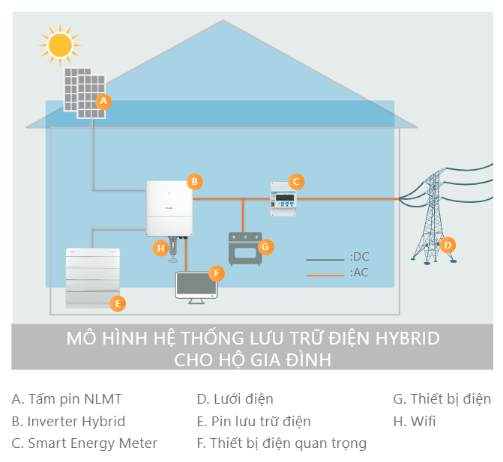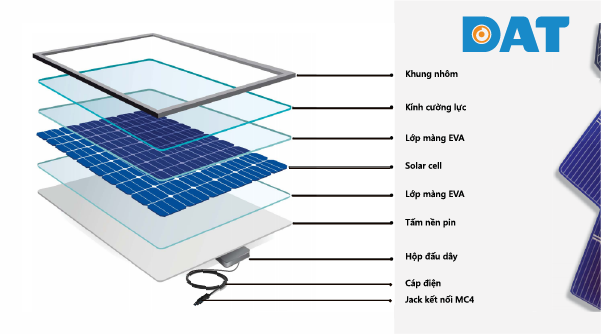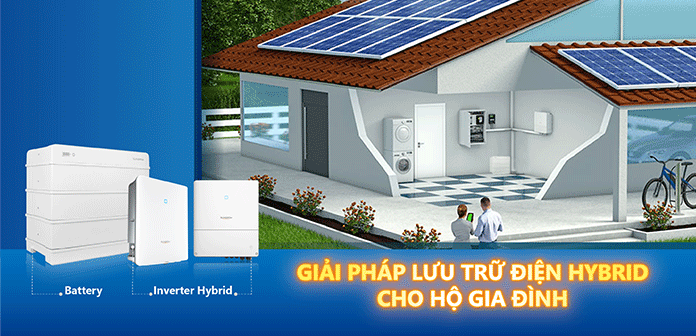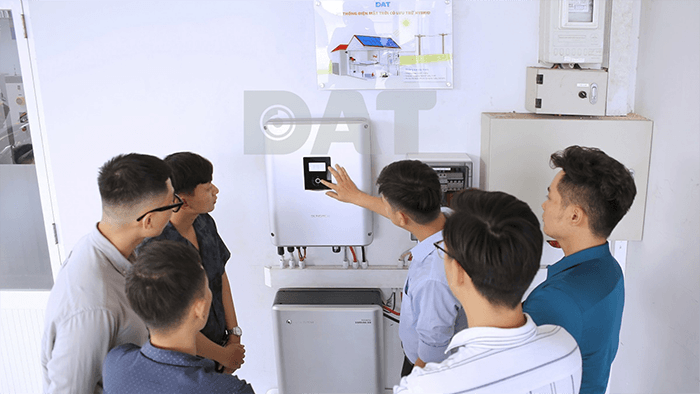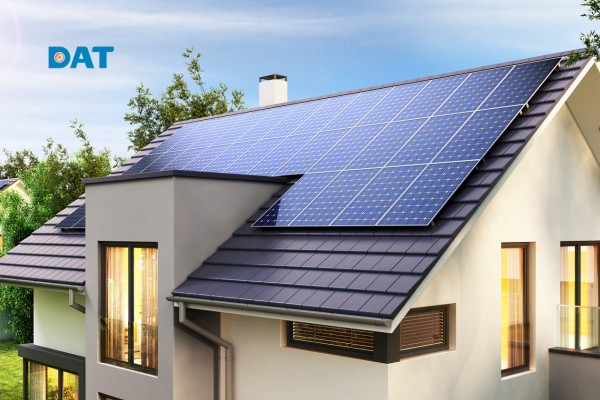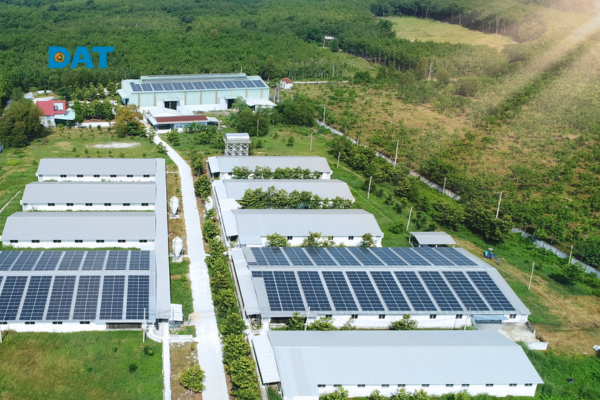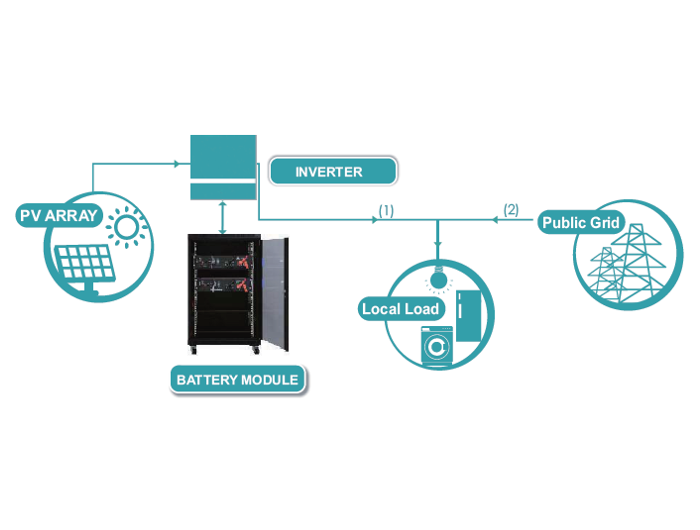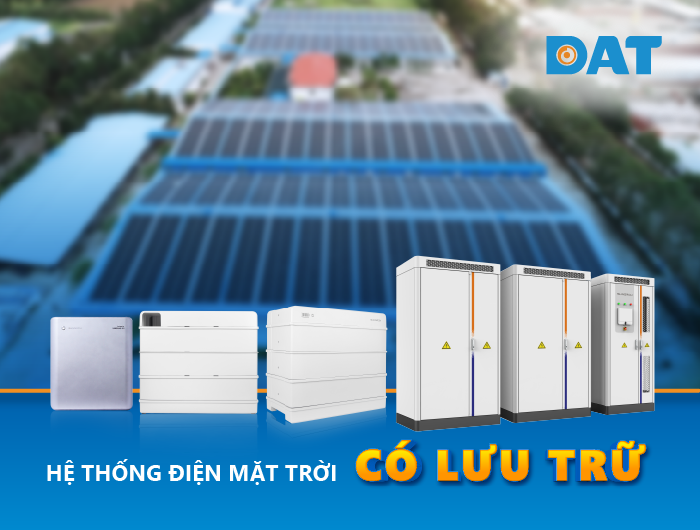Hệ thống Điện mặt trời có lưu trữ
Trong những năm gần đây, xu hướng sử dụng hệ thống năng lượng mặt trời đang ngày càng phổ biến tại Việt Nam. Trong đó, hệ thống điện mặt trời có lưu trữ được đánh giá là một bước tiến quan trọng, giúp tối ưu hóa hiệu quả sử dụng điện, đảm bảo nguồn điện liên tục ngay cả khi mất điện lưới. Đặc biệt, mô hình này phù hợp với cả hộ gia đình và doanh nghiệp có nhu cầu sử dụng điện ổn định, bền vững và tiết kiệm chi phí dài hạn.
1. Hệ thống điện mặt trời có lưu trữ là gì?
Hệ thống điện mặt trời có lưu trữ, còn gọi là hệ thống Hybrid, là sự kết hợp giữa hệ thống điện mặt trời hòa lưới và hệ thống điện mặt trời độc lập. Điểm đặc biệt của hệ thống này nằm ở khả năng lưu trữ năng lượng điện mặt trời dư thừa thông qua ắc quy hoặc pin lithium. Nguồn điện này sẽ được sử dụng vào ban đêm hoặc trong trường hợp lưới điện gặp sự cố.
Không chỉ có khả năng cung cấp điện liên tục, hệ thống điện mặt trời có lưu trữ còn giúp giảm thiểu sự phụ thuộc vào điện lưới và tối ưu hiệu suất khai thác điện mặt trời trong suốt cả ngày. Bên cạnh đó, với các hệ thống lưu trữ điện công suất lớn dành cho doanh nghiệp hoặc nhà máy, giải pháp lưu trữ điện ESS (Energy Storage System) được xem là lựa chọn phù hợp hơn cả.
2. Cấu tạo của hệ thống điện mặt trời có lưu trữ
Để hệ thống hoạt động hiệu quả và ổn định, cần có đầy đủ các thành phần chính sau:
2.1. Tấm pin năng lượng mặt trời
Đây là bộ phận quan trọng đầu tiên trong hệ thống năng lượng mặt trời. Tấm pin có nhiệm vụ hấp thụ bức xạ ánh sáng mặt trời và chuyển hóa thành dòng điện một chiều (DC). Cấu tạo tấm pin thường bao gồm khung nhôm, kính cường lực, lớp màng EVA, tế bào quang điện (solar cell), tấm nền sau, hộp đấu dây, cáp và jack kết nối.
Hiện nay, có hai loại pin phổ biến là:
-
Tấm pin đơn tinh thể (Mono): Cho hiệu suất cao, màu đen đồng nhất, giá thành cao hơn.
-
Tấm pin đa tinh thể (Poly): Chi phí thấp hơn, màu xanh dương, độ bền tốt, phù hợp với điều kiện thời tiết nóng ẩm ở Việt Nam.
2.2. Inverter Hybrid
Inverter Hybrid đóng vai trò chuyển đổi dòng điện một chiều thành dòng điện xoay chiều (AC) để cung cấp cho các thiết bị điện. Bên cạnh đó, nó còn đảm nhận nhiệm vụ sạc và xả năng lượng từ pin lưu trữ. Khi lưới điện mất, inverter Hybrid sẽ tự động lấy điện từ pin để cung cấp cho các thiết bị thiết yếu trong nhà.
2.3. Ắc quy hoặc pin lưu trữ điện
Bộ phận này giúp lưu trữ lượng điện mặt trời dư thừa để sử dụng khi cần thiết. Trong đó, pin lithium được ưa chuộng hơn so với ắc quy truyền thống nhờ vào độ bền cao, khả năng sạc xả tốt và tuổi thọ lâu dài.
Ngoài các thiết bị chính nêu trên, một hệ thống năng lượng mặt trời có lưu trữ còn có các thành phần phụ như tủ điện DC/AC, thiết bị chống sét lan truyền, đồng hồ đo công suất, module wifi và hệ thống giám sát.
3. Cơ chế hoạt động của hệ thống điện mặt trời có lưu trữ
Hệ thống điện mặt trời có lưu trữ hoạt động theo nguyên lý ưu tiên sử dụng năng lượng mặt trời. Cụ thể, vào ban ngày, các tấm pin sẽ tạo ra điện năng để cung cấp trực tiếp cho các thiết bị điện và sạc đầy cho pin lưu trữ.
Nếu lượng điện tạo ra vượt quá nhu cầu sử dụng và pin đã sạc đầy, phần điện dư sẽ được hòa vào lưới điện. Trong trường hợp điện mặt trời không đủ cung cấp, hệ thống sẽ lấy thêm điện từ lưới để duy trì hoạt động.
Khi mất điện, hệ thống sẽ tự động chuyển sang sử dụng điện từ pin lưu trữ để cung cấp cho các tải ưu tiên. Nhờ vậy, người dùng sẽ không bị gián đoạn sinh hoạt và làm việc.
4. Ưu điểm và nhược điểm của hệ thống điện mặt trời có lưu trữ
4.1. Ưu điểm
Hệ thống năng lượng mặt trời có lưu trữ mang lại nhiều lợi ích thiết thực:
-
Duy trì nguồn điện ổn định 24/7 cho các thiết bị quan trọng như camera, máy tính, wifi, tủ lạnh, thang máy, v.v.
-
Giảm phụ thuộc vào lưới điện quốc gia, hạn chế rủi ro từ sự cố mất điện.
-
Tối ưu hiệu suất sử dụng điện mặt trời bằng cách lưu trữ và tái sử dụng nguồn điện dư thừa.
-
Giảm chi phí tiền điện hàng tháng thông qua cơ chế sạc/xả theo thời gian, đặc biệt hiệu quả đối với khách hàng sử dụng điện 3 khung giờ (cao điểm – thấp điểm).
-
Thay thế máy phát điện truyền thống, không gây tiếng ồn, không thải khí độc, thân thiện với môi trường.
4.2. Nhược điểm
Tuy nhiên, hệ thống năng lượng mặt trời này cũng có một số hạn chế cần lưu ý:
-
Chi phí đầu tư ban đầu cao do cần thêm inverter Hybrid và pin lưu trữ.
-
Quá trình thiết kế, lắp đặt đòi hỏi kỹ thuật cao, cần sự tư vấn từ đơn vị uy tín.
-
Công suất hệ thống cần được tính toán kỹ lưỡng dựa trên mức tiêu thụ điện thực tế và thời gian sử dụng điện dự phòng.
5. Ứng dụng của hệ thống điện mặt trời có lưu trữ
Với tính năng duy trì nguồn điện liên tục, hệ thống này được ứng dụng rộng rãi cho:
-
Hộ gia đình cần sử dụng điện ổn định, tránh gián đoạn khi mất điện.
-
Doanh nghiệp hoạt động trong lĩnh vực công nghệ, trung tâm dữ liệu, y tế, viễn thông, nơi đòi hỏi nguồn điện chất lượng cao.
-
Các khu vực khó tiếp cận lưới điện hoặc thường xuyên gặp sự cố điện lưới.
-
Các công trình xây dựng hoặc nhà máy có yêu cầu cao về an toàn năng lượng và vận hành ổn định.
Đối với các hệ thống quy mô lớn, giải pháp ESS sẽ giúp lưu trữ và quản lý năng lượng hiệu quả hơn trong dài hạn.
6. DAT Solar – Đơn vị tiên phong cung cấp hệ thống năng lượng mặt trời có lưu trữ
Thành lập từ năm 2006, DAT Solar tự hào là đơn vị hàng đầu trong việc cung cấp các giải pháp hệ thống năng lượng mặt trời tại Việt Nam. Đối với hệ thống điện mặt trời có lưu trữ, DAT Solar mang đến các giải pháp phù hợp với từng hộ gia đình, doanh nghiệp nhờ vào sự kết hợp giữa sản phẩm chất lượng, đội ngũ kỹ thuật chuyên môn cao và dịch vụ hậu mãi tận tâm.
Trước khi triển khai, đội ngũ kỹ sư sẽ khảo sát thực tế tải tiêu thụ điện, phân tích cấu trúc hệ thống điện hiện hữu, sau đó tư vấn phương án thiết kế tối ưu nhằm đáp ứng đầy đủ nhu cầu sử dụng điện và yêu cầu dự phòng. Mục tiêu cuối cùng là giúp khách hàng chủ động nguồn điện, nâng cao hiệu quả sử dụng và tiết kiệm chi phí lâu dài.
Vậy, còn chần chờ gì mà không lắp đặt hệ thống điện mặt trời lưu trữ Hybrid cùng DAT Solar. Để được tư vấn thêm về giải pháp Hybrid, liên hệ ngay hotline 1800 6567 (miễn phí cước gọi), chúng tôi sẵn sàng đồng hành và hỗ trợ 24/7.

